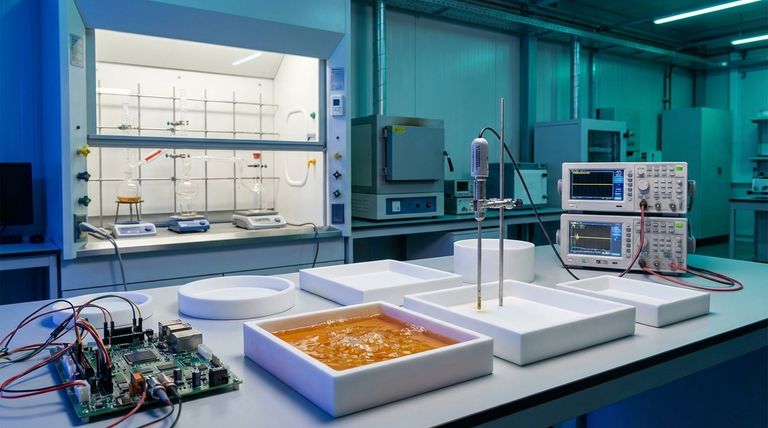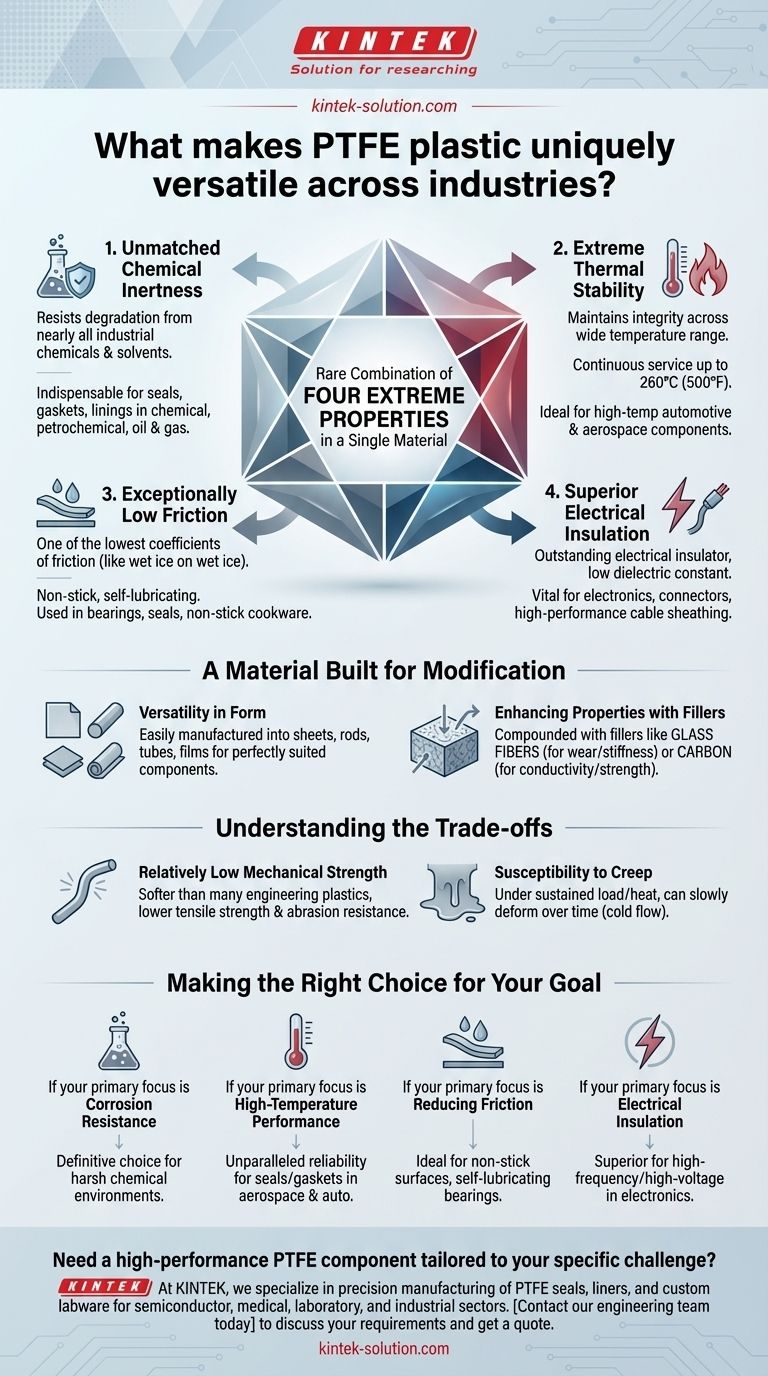At its core, PTFE's unique versatility comes from a rare combination of four extreme properties in a single material: near-total chemical resistance, broad thermal stability, an exceptionally low coefficient of friction, and excellent electrical insulation. This powerful synergy allows it to solve critical engineering challenges in industries ranging from aerospace to healthcare.
PTFE (Polytetrafluoroethylene) is not simply a high-performance plastic; it is a foundational "problem-solver" material. Its value lies in its ability to maintain its core properties under conditions where most other materials would fail chemically, thermally, or mechanically.

The Four Pillars of PTFE's Versatility
The widespread adoption of PTFE is not due to a single feature, but the simultaneous presence of several class-leading characteristics. Understanding these pillars is key to grasping its industrial importance.
Pillar 1: Unmatched Chemical Inertness
PTFE is one of the most chemically inert polymers known. It resists degradation from nearly all industrial chemicals, solvents, and corrosive agents.
This property makes it indispensable for applications involving aggressive substances, such as seals, gaskets, and corrosion-resistant linings in the chemical, petrochemical, and oil & gas industries.
Pillar 2: Extreme Thermal Stability
The material maintains its integrity and performance across an exceptionally wide temperature range, reliably performing in continuous service up to 260°C (500°F).
This thermal resilience makes it a go-to choice for high-temperature seals and components in automotive, aerospace, and demanding industrial environments where temperature fluctuations are common.
Pillar 3: Exceptionally Low Friction
PTFE has one of the lowest coefficients of friction of any solid material, often compared to wet ice on wet ice. This results in its famous non-stick, self-lubricating surface.
This characteristic is the reason for its use in non-stick cookware, but it is also critical for industrial applications like low-friction bearings, cable sheaths, and seals that must operate smoothly with minimal wear.
Pillar 4: Superior Electrical Insulation
With a very low dielectric constant and high dielectric strength, PTFE is an outstanding electrical insulator, especially at high radio frequencies.
This makes it a vital material in the electronics and electrical industries for producing insulators, connectors, and high-performance cable sheathing where signal integrity is paramount.
A Material Built for Modification
Beyond its intrinsic properties, PTFE's versatility is enhanced by its physical adaptability. It is not a rigid, one-size-fits-all solution.
Versatility in Form
PTFE can be easily manufactured and machined into a wide variety of standard shapes, including sheets, rods, tubes, and thin films.
This allows engineers to design components that are perfectly suited to specific application geometries, from a simple gasket to a complex valve part.
Enhancing Properties with Fillers
Base PTFE can be compounded with fillers to augment specific mechanical properties.
For instance, adding glass fibers significantly increases wear resistance and stiffness. Adding carbon can improve thermal conductivity and strength, tailoring the material for even more demanding roles.
Understanding the Trade-offs
No material is perfect, and objectivity requires acknowledging PTFE's limitations. While it excels in extreme environments, it possesses certain mechanical weaknesses.
Relatively Low Mechanical Strength
Compared to many engineering plastics, PTFE is relatively soft and has lower tensile strength and abrasion resistance in its pure form. This is why fillers are often used for mechanically demanding applications.
Susceptibility to Creep
Under a sustained load, especially at elevated temperatures, PTFE can be subject to "creep" or cold flow, meaning it can slowly deform over time. Design considerations must account for this behavior.
Making the Right Choice for Your Goal
Selecting PTFE is about matching its elite properties to a specific engineering challenge.
- If your primary focus is corrosion resistance: PTFE is the definitive choice for sealing or lining equipment in the harshest chemical processing environments.
- If your primary focus is high-temperature performance: It provides unparalleled reliability for seals, gaskets, and components in aerospace and automotive applications.
- If your primary focus is reducing friction: It is the ideal material for non-stick surfaces, self-lubricating bearings, and low-drag coatings.
- If your primary focus is electrical insulation: Its properties make it superior for high-frequency and high-voltage applications in electronics and communications.
Ultimately, PTFE's enduring value comes from its ability to provide a reliable solution where other materials simply cannot perform.
Summary Table:
| Key Property | Industry Application | Primary Benefit |
|---|---|---|
| Chemical Inertness | Chemical Processing, Oil & Gas | Resists corrosion from harsh chemicals |
| Thermal Stability | Aerospace, Automotive | Performs reliably from cryogenic to 260°C (500°F) |
| Low Friction | Manufacturing, Food Processing | Self-lubricating, non-stick surfaces reduce wear |
| Electrical Insulation | Electronics, Telecommunications | Excellent insulator for high-frequency signals |
Need a high-performance PTFE component tailored to your specific challenge?
At KINTEK, we specialize in the precision manufacturing of PTFE components—including seals, liners, and custom labware—for the semiconductor, medical, laboratory, and industrial sectors. Whether you require a standard part or a custom-fabricated solution from prototype to high-volume production, our expertise ensures you get a component that leverages PTFE's full potential for your application.
Contact our engineering team today to discuss your requirements and get a quote.
Visual Guide

Related Products
- Custom PTFE Parts Manufacturer for Teflon Containers and Components
- Custom PTFE Parts Manufacturer for Teflon Parts and PTFE Tweezers
- Custom PTFE Measuring Cylinders for Advanced Scientific and Industrial Applications
- Custom PTFE Bottles for Diverse Industrial Applications
- Customizable PTFE Seals Filter Holders for Versatile Applications
People Also Ask
- What are the key benefits of PTFE in custom fabrication? Unlock Performance in Extreme Conditions
- What are the primary applications of PTFE fasteners and custom parts? Critical Solutions for Extreme Environments
- What are the unique properties of PTFE? Unlock Unmatched Performance in Demanding Applications
- What are the base characteristics of PTFE? Unlocking Extreme Performance in Friction, Temperature, and Chemical Resistance
- What is PTFE commonly known as and what are its unique properties? Unlock Unmatched Chemical & Thermal Resistance



















